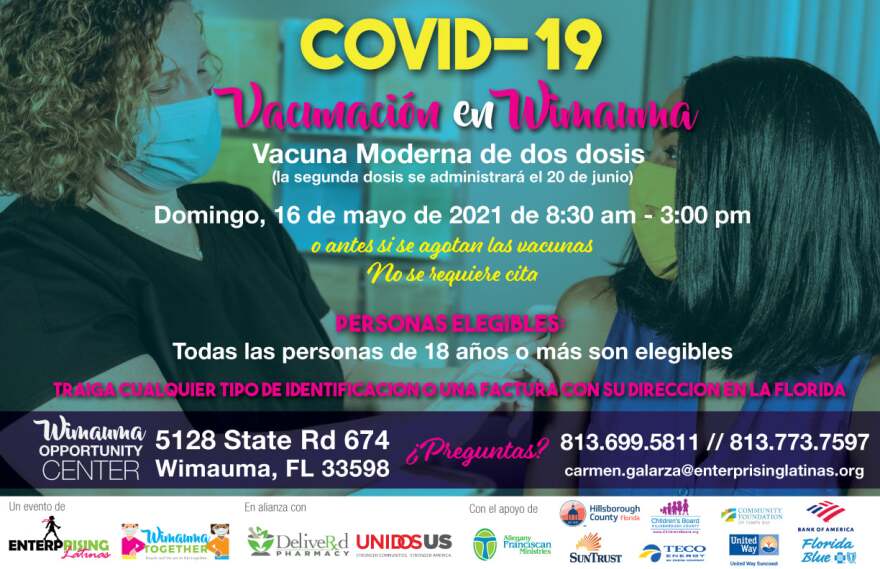About one-fourth of Florida's Hispanic population has been vaccinated against COVID-19, compared to nearly 40% of whites. Government and community outreach efforts are looking to close those gaps by making it easier for Latinx residents to access shots.
Shoppers entering a Latin supermarket in the Tampa suburb of Town 'N Country on a recent morning were greeted by folks in neon green shirts asking in English or, more commonly, Spanish, “Have you gotten the COVID-19 vaccine?”
Canvassers Jack Alvarez and Evelyn Escalante work for the state and used tablets to help anyone who answered "no" register for shots if they were willing. They directed people to a mobile vaccination site the state was hosting in a park down the block that day, but could also sign people up with local pharmacies.
Oswaldo Simón, 66, encountered them on his way into the store and welcomed their help signing up for an appointment. He planned to have his daughter take him to the mobile site after he finished his errands.
Simón said he always wanted a vaccine, but because of his immigration status, he had to wait to get proper identification. Even then, he said he didn’t know where to get a shot.
Alvarez translated as Simón told him in Spanish that he was grateful for this opportunity.
“He said it’s a benefit for him, and for all society, it’s good to do it,” explained Alvarez.
Since March, these canvassers have been on a team contracted by the Florida Division of Emergency Management to help vaccinate underserved residents in Hillsborough County. Other teams are doing similar work around the state.
They consult with local authorities and use the Centers for Disease Control and Prevention’s Social Vulnerability Index as a tool to help identify neighborhoods to visit, according to division spokesperson Samantha Bequer.
The CDC looks at factors such as income, English proficiency and access transportation to gauge a community’s risk in a public health emergency and determine its SVI. Canvassing teams try to focus on areas considered highly vulnerable.
Stacey Gedeon, a nurse supervising the effort, said when her team goes into areas like predominantly Hispanic Town ‘N Country, it is vital to have bilingual staff.
“They are our front-liners when we come to communities that speak mainly Spanish,” she said. “I’ll have them go to door-to-door and stand in plazas so they can converse [with residents], because it’s breaking down that wall, another wall of accessibility.”
The state isn't alone in its efforts. County governments, universities, churches, nonprofits and foreign institutions such as the Mexican Consulate are all working to vaccinate more Latinx Floridians.
According to a recent analysis published by the Kaiser Family Foundation, white people are being vaccinated at 1.5 times the rate of Hispanics in Florida, despite the pandemic disproportionately harming the latter community.
Addressing language barriers is necessary to reducing this disparity, according to Ileana Cintron, deputy director of Enterprising Latinas. The nonprofit is one of several community organizations spearheading COVID-19 outreach in Wimauma.
Most residents in the rural community in southeast Hillsborough County identify as Hispanic, and about 30% of Wimauma’s population has tested positive for the virus since the pandemic began.
Cintron said the technical language associated with the vaccines, from the science of how they work to the frequently changing rules about how to get them, can be confusing for anyone to understand.
“So it’s so critical that we have access to information that is not only translated into Spanish but that it’s culturally competent translations and culturally sensitive translations,” she said. “The Hispanic community is enormously diverse, so many different national origins, and folks from different regions understand things in different ways.”
Another obstacle is time. Cintron said a lot of the families she serves are constantly working. Many are migrant farmworkers or parents who work multiple jobs. Even if they can travel to a vaccination site, it's hard to commit to taking a day off or possibly more if they experience symptoms after their shot.
So Cintron said the mobile clinics that show up for one day on short notice aren't always the best strategy.
“Because people have to organize their time around their work schedules, because the income is so low, so they need to protect their work hours and the wages of those working hours as much as they can,” she explained.
Cintron cited a vaccine clinic earlier this year where community partner Beth-El Farmworker Ministry coordinated with farm owners to get employees time off, and in some cases, rides to the event.
Enterprising Latinas has scheduled another vaccination event for Wimauma residents on Sun., May 16, and has been getting the word out well in advance so people can prepare.
Some members of the community require extra convincing. Cintron acknowledged the myths spread through word-of-mouth and on the Internet, and added that for some Hispanics, distrust in government and science goes beyond the vaccines.
As part of the Wimauma Together Collaborative, Enterprising Latinas recently teamed up with health workers to host bilingual webinars to allow attendees to express their questions and concerns about COVID-19 vaccines.
They’re also partnering with other organizations to put public service announcements on social media and Spanish-language radio stations, and to go into neighborhoods to connect with families directly.
“It's something that has to be earned that way, or otherwise any misinformation or misunderstanding erodes trust and then the relationship breaks, right and then you're not able to get through," Cintron said.
Demand statewide for vaccines may be lowering, but Cintron said the work is nowhere near done. She expects it will take months to get vaccination rates among Latinx residents to the levels they need to be.
Cintron said her team is in it for the long haul.
Verónica Zaragovia contributed to this story.
WUSF is reporting on how distribution of the COVID-19 vaccine exposes inequities in Florida’s health care system. Read more by visiting the Unequal Shots page.

Copyright 2021 WUSF Public Media - WUSF 89.7







